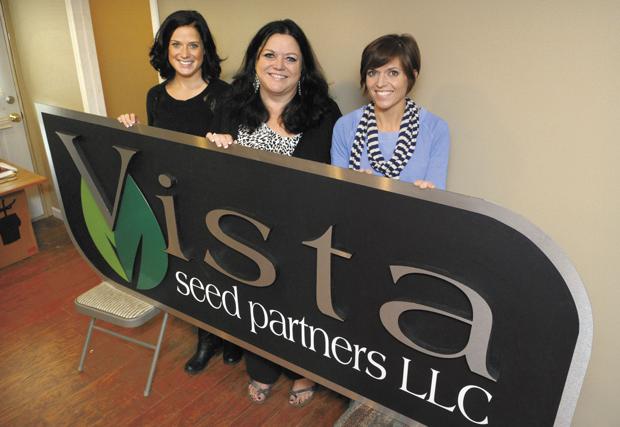Seed World takes a rare look into boardrooms and senior management to examine the role women play and the skill sets they bring to the table.
There’s a global shift happening in the business world and the seed industry is no exception. The number of women in senior management roles is increasing and research shows that this added diversity leads to better dividends.
The latest research from the International Business Report shows that women now hold 24 percent of senior management roles globally, a three-point increase from 2012. Additionally, the proportion of businesses employing women as CEOs has risen from 9 percent to 14 percent, and just 19 percent of board roles globally are held by women.
While these numbers might seem stark, they suggest the future is bright. The World Bank reports that today more women are studying at universities than men in the 60 countries it researched. Here at home, 2010 marked the first year that more women received advanced degrees than men and in 2013, there were more women on Forbes’ billionaires list than ever, with 138 women in the ranks — up from 104. Of those 138 women, 24 started their own business.

Leading the way, Risa Demasi is a partner at Grassland Oregon.
American Express reports that as of 2012, there are more than 8.3 million women-owned businesses in the United States, which is up 54 percent in the past 15 years, and that women are starting businesses at a rate of 1.5 times that of men. Additionally, women are filing more patents, doubling their share since 1990, according to the National Women’s Business Council.
Within the seed industry, Risa Demasi, partner at Grassland Oregon, represents a major change — one of a new generation of women taking on prominent leadership roles in an industry that has historically been led by men. Demasi is the first woman ever elected to the American Seed Trade Association’s board of directors.
Having grown up on a cattle farm in Albany, Oregon, Demasi had no intentions of getting into the agriculture industry. She dreamed of entering the fashion world. “I was convinced I was going to have my own clothing store,” says Demasi, who had been working for Nordstrom at the time.
A chance opportunity to work for a seed company brought her into agriculture, and she’s now one of three active partners in Grassland Oregon, a leading developer and provider of top-rated seed varieties of cool-season grass and legume species.
“When I started in the industry, there were just a few women in decision-making roles in our sector of the seed industry,” Demasi says. “You could probably count them on one hand.”

Laurie Wolinski serves as the director of the Northeast Extension Risk Management Education Center at the University of Delaware, which hosts the bi-annual Women in Agriculture Educators National Conference.
While there are no statistics specific to the seed industry, Laurie Wolinski, director of the Northeast Extension Risk Management Education Center at the University of Delaware, says that’s changing, and at a faster and faster rate. While the center focuses on educating stakeholders about the unique risks of producing food for the world’s table, it also hosts the bi-annual Women in Agriculture Educators National Conference, which began in 2004.
“More and more women are pursuing agricultural degrees. That carries into the industry. When I started working for the University of Delaware 25 years ago, I was one of only three women working with agricultural producers in my county office. Now, in that particular office, there are as many women as men. It’s changing. Has it been slow to change? Probably. But it’s changing,” Wolinski says.
For Demasi, proof of women’s significant involvement in the industry isn’t found in an Internet search or a statistical report — but in the fields, laboratories, offices and boardrooms across the U.S. Those women include the likes of Ellen Kullman, CEO and chair of DuPont; Pam Bailey, president and CEO of the Grocery Manufacturers Association; Beth Ford, executive vice president and chief supply chain and operations manager at Land O’Lakes, the second-largest member-owned ag cooperative in the U.S.; and Jennifer Rashet, U.S. row crops manufacturing quality lead for Monsanto.
So just what do these women bring to the table? A 2011 McKinsey review of 100 companies against the Organizational Health Index found that companies with three or more women in top positions (on the executive committee or board) scored higher than their peers. Another report concludes that the “overall median proportion of female executives was 7.1 percent at successful companies and 3.1 percent at unsuccessful companies, demonstrating the value that having more females can potentially bring to a management team.”

Jennifer Rashet is the U.S. row crops manufacturing quality lead for Monsanto and also serves on the American Seed Trade Association’s Seed Industry Relations Committee and Phytosanitary Committee.
Diversity Builds
In another study tracking results from Fortune 500 companies from 2004 to 2008, those companies with the most women on the board of directors outperformed those with the least by at least 16 percent in terms of return on sales and 26 percent in terms of return on investment capital.
According to the Korn/Ferry Institute, which generates research that shows how talent advances business strategy, the similarities between male and female leaders are striking but there are also significant differences.
In leadership style scores, women were statistically different in three of the four categories. Men in the C-suite (named after all the “C” titles in senior management teams — CEO, CFO, COO) relied more on a task-oriented style, while females used slightly more of the social and participatory styles. Meanwhile, there were no significant gender differences on intellectual leadership scores.
According to their research, in the absence of social dynamics, male and female C-suite executives have very consistent ways of making decisions. However, the institute reported one exception: female executives in the C-suite had higher creative thinking scores than males executives.
“Both genders are high scoring as creative and complex thinkers, which means they generate a multitude of innovative solutions, consider potential effects, identify the best choice and develop a strategy to attain it,” says Dana Landis, vice president of global search assessment for Korn/Ferry International. “But female executives likely will prefer to amass more diverse data and spend more time considering alternative solutions. This slight difference in approach to strategic decision-making may be beneficial when addressing long-term or high-stakes decisions.”
Female executives score higher than men in ambiguity tolerance, suggesting slightly greater comfort with situations that are more abstract and influx or when the correct or most prosperous course of action has not yet revealed itself. They appear to be more adept at navigating complex social situations, “reading the room,” and accurately perceiving the needs and motivations of those around them.
Additionally, the Korn/Ferry Institute found that female execs exhibit greater energy scores than their male counterparts. Energy is defined as mental tenacity, the capability to sustain analytic thinking and stick with a persistent or highly complex problem until a solution is found. The authors write that “women who are presently top executives likely faced a great deal of resistance during their ascension … those who are in the C-suite today likely had to out-study, outwork and outperform their male counterparts.”

Looking back at her early years, Demasi never expected to find herself at the helm of a seed company and preparing to lead an organization such as ASTA. Elected as second vice chair of ASTA in 2013, Demasi is currently first vice chair and is expected to fill the position of chair in 2015 — making her the first female chair in the association’s then 133-year history.
Demasi’s formal education took place at Hesston College in Kansas where she obtained an undergraduate degree. Her “real” education, as she calls it, would take the form of “a long, interesting and hard-fought education in life experiences. I’m incredibly grateful for all the opportunities I’ve been provided,” Demasi says.
Those opportunities included working for Olsen-Fennell Seeds, which was purchased in 1998 by AgriBiotech. In 2000, Demasi co-founded Grassland Oregon. “Jerry Hall, our president, had the foresight to bring the originating working partners together,” she explains. “His foresight, and with our creative vision, led to one of those fortunate opportunities I have been so thankful for. It’s been a fascinating and challenging ride to create Grassland Oregon from scratch.”
The Korn/Ferry Institute also reports that research shows “that women tend to share credit, advocate for their whole team and strive for group wins.”
As the first and only female officer around the table in ASTA’s boardroom today, Demasi who is only 48, adds a woman’s perspective and enjoys the experience every step of the way. “I’m sure we [women] probably bring a little bit different perspective on things,” Demasi acknowledges. “And different is good; any time you or your organization broaden your thinking, you learn.”
While Demasi says its great being the first woman to sit at ASTA’s boardroom table, she’s never felt that her voice was different than anyone else’s there.
“There are more and more women all the time in the industry in a myriad of roles — active roles within their organizations, large and small,” she says.
In an age where books such as Men Are From Mars, Women Are From Venus are popular reading material, Demasi isn’t so sure men and women are really that different from one another when it comes to their influence within the seed industry. “It’s easy to get hung up on the various reports you see in the media about the differences between men and women, but I think getting bogged down in that is a hindrance rather than a help,” she says. “I’d rather think about the potential and the opportunities that exist today.”
Monsanto’s Rashet agrees. The U.S. row crops manufacturing quality lead has been involved in the industry for the past 14 years, and feels an important quality women bring to the industry is a desire for inclusivity.
“I think women have been representative of good leadership in all sectors, not just the seed sector,” Rashet says. “We’ve seen a lot of companies really work to make a difference and make changes to foster a more diverse environment, being more inclusive to women. I think the industry is really aware of that and trying to bolster women in leadership roles.”
Rashet, who serves on ASTA’s Seed Industry Relations Committee and Phytosanitary Committee, is also someone who didn’t initially imagine herself working in agriculture. She majored in Spanish at Washington University in Saint Louis and earned her executive master’s degree in international business from Saint Louis University.

Global Perspective
Rashet says that having some female leadership helps seed companies operate better from a global perspective. “I always wanted to be in international business,” she says, adding that being a woman in the seed industry has helped her fulfill that dream. “Having that female voice at the table can bring an important perspective when it comes to talking about the value the seed industry has across the world; it’s especially important when you’re talking with mothers and Millennials, and some of the more food-minded folks we tend to call ‘foodies.’”
Wolinski agrees. “I think having women in leadership roles gives companies an opportunity to approach decision-making in a different way. From a consumer perspective, for example, women still make a lot of the nutrition decisions in their own households, and that perspective might have influence in a boardroom. Companies can only benefit from that.”
The influence women bring to their respective organizations is getting noticed — Demasi points to women like Karen Withers of Oregon’s Pennington Seed Company, who was named Young Seedsman of the Year at the 2013 Western Seed Association convention, as proof that women in seed the seed industry are being recognized for their contributions.
“Any time you get someone in a new group with a unique perspective, that’s a benefit,” Demasi says. “I get caught up in my own way of thinking, but the larger my networking circle grows, the more opportunities I have to be exposed to new ideas and apply them to what I’m working on so I can break that cycle. That’s not unique to women, but to anyone working in a complex industry.”
The original article published on Seed World can be found here.









